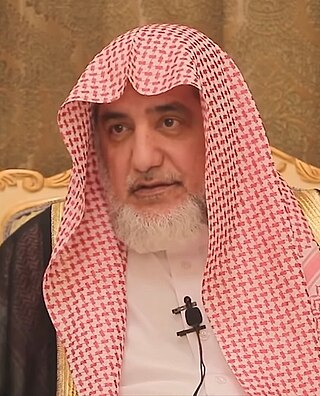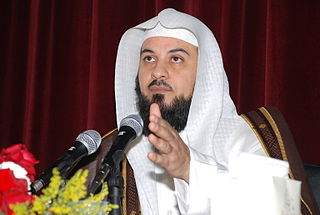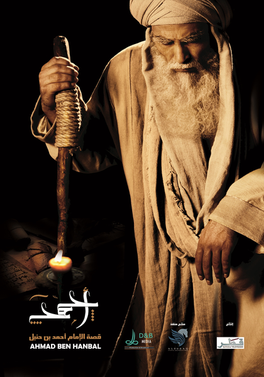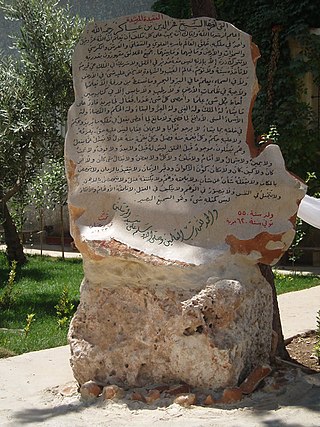Muḥammad ibn ʿAbd al-Wahhāb ibn Sulaymān al-Tamīmī was a Sunni Muslim scholar, theologian, preacher, activist, religious leader, jurist, and reformer from Najd in central Arabia, considered as the eponymous founder of the so-called Wahhabi movement. His prominent students included his sons Ḥusayn, Abdullāh, ʿAlī, and Ibrāhīm, his grandson ʿAbdur-Raḥman ibn Ḥasan, his son-in-law ʿAbdul-ʿAzīz ibn Muḥammad ibn Saʿūd, Ḥamād ibn Nāṣir ibn Muʿammar, and Ḥusayn āl-Ghannām.

Diriyah, formerly romanized as Dereyeh and Dariyya, is a town and governorate in Saudi Arabia located on the northwestern outskirts of the Saudi capital, Riyadh. Diriyah was the original home of the Saudi royal family, and served as the capital of the Emirate of Diriyah under the first Saudi dynasty from 1727 to 1818. Today, the town is the seat of the Diriyah Governorate—which also includes the villages of Uyayna, Jubayla, and Al-Ammariyyah, among others—and is part of Ar Riyad Province.
Muhammad ibn Salih al-Uthaymin was a Saudi Islamic scholar.

Abdulla Bin Zaid Al Mahmoud Islamic Cultural Center is a cultural organization in Doha, the capital of Qatar. It is located close to Doha Corniche and is a prominent landmark in the city.

Qatar is a Muslim-majority country with Islam as the state religion. Salafi version of Islam is the state sponsored brand of Sunni Islam in the country, making Qatar one of the two Salafi states in the Muslim world, along with Saudi Arabia.

Saleh bin Abdul-Aziz Al ash-Sheikh is a Saudi cleric who served as the minister of Islamic affairs, endowments, call and guidance of Saudi Arabia between 1996 and 2014, and again since 2015. He is a member of the Al ash-Sheikh, the influential Saudi religious family.

Muhammad bin Abdul-Rahman al-Arifi is a Saudi Arabian author and Da'i. He is a graduate of King Saud University, and member of the Muslim World League and the Association of Muslim Scholars.
Abū Muḥammad ʿIzz al-Dīn ʿAbd al-ʿAzīz bin ʿAbd al-Salām bin Abī al-Qāsim bin Ḥasan al-Sulamī al-Shāfiʿī, also known by his titles, Sultan al-'Ulama/ Sulthanul Ulama, Abu Muhammad al-Sulami, was a famous mujtahid, Ash'ari theologian, jurist and the leading Shafi'i authority of his generation. He was described by Al-Dhahabi as someone who attained the rank of ijtihad, with asceticism and piety and the command of virtue and forbidding of what is evil and solidity in religion. He was described by Ibn al-Imad al-Hanbali as the sheikh of Islam, the imam of the scholar, the lone of his era, the authority of scholars, who excelled in jurisprudence(Fiqh), theology(Aqidah) and the Arabic language, and reached the rank of ijtihad, and received students who traveled to him from all over the country.

Lejbailat is a district in Qatar, located in the municipality of Doha. It has a relatively higher elevation compared to the rest of Doha and provides a vantage point of West Bay, one of Doha's main commercial districts. Imam Muhammad ibn Abd al-Wahhab Mosque, Qatar's state mosque, is situated in the district.

The Qatari Ministry of Awqaf and Islamic Affairs (AWQAFM) is a Qatari government agency also known as the Ministry of Endowments and Islamic Affairs and the Qatar Awqaf Authority. AWQAFM was created in April 2022 with the stated aim of "ensuring that all areas of modern life comply with the principles of Islam."
Sa'ad bin Ateeq bin Misfer Al Ateeq, is an Islamic preacher, religious scholar, thinker and university professor from Saudi Arabia. He is considered controversial by some for the topic of the religious sermons he has delivered and his connections to governments of Arab states of the Persian Gulf, including the United Arab Emirates, Qatar and Saudi Arabia, particularly the Imam Muhammad ibn Abd al-Wahhab Mosque. The Foundation for Defense of Democracies, The Daily Beast, and Foreign Policy magazine have run articles about Al-Ateeq, expressing concerns about his alleged fanaticism and fundamentalist hard-line views. Foreign Policy has even compiled extensive documentation of his government-sponsored activities.

The Imam series or Bin Hanbal series or Ahmed bin Hanbal series, is a historical television series produced by Qatar Media Foundation, which carried out the work in cooperation with Al-Buraq Qatari Media Production Company, For the Ramadan show with the participation of a large group of artists from seven Arab countries with more than 70 artists and representatives, and the implementation of the serial through documentation and dramatic treatment and film production and took the production of the series more than two years between 2015 and 2016, more than a full year.

Ahmad Zayni Dahlan (1816–1886) was the Grand Mufti of Mecca between 1871 and his death. He also held the position of Shaykh al-Islam in the Hejaz and Imam al-Haramayn. Theologically and juridically, he followed the Shafi'i school of thought.

Sheikh Abdul Rahman bin Nasser Al-Saadi, also known as al-Siʿdī (1889–1957), was an Islamic Scholar from Saudi Arabia. He was a teacher and an author in Unaizah, Saudi Arabia. He authored more than 40 books in several different fields including tafsir, fiqh, and 'aqidah. al-Sa'di was an influential figure in the field of tafsir and his book of tafsir entitled Taysir al-Kareem al-Rahman has been described as arguably one of the most popular tafsirs written by modern salafi scholars. He served as the imam and khateeb for the largest jami' mosque and director of the religious training school, al-Ma'had al-'Ilmi, of Unayzah.
Imam Sulaymān ibn ‘Abd al-Wahhāb at-Tamīmī was an Islamic scholar, Hanbali jurist, and theologian from the Najd region in central Arabia. He was the elder brother of Muhammad ibn Abd al-Wahhab, the founder of the Wahhabi movement, and he was one of the first critics of his brother and the Wahhabi movement. He considered the Wahhabi doctrine a heresy and it is likely that he was the first to use the word "Wahhabi" to refer to his brother's doctrine in his alleged treatise The Unmistakable Judgment in the Refutation of Muhammad ibn 'Abd al-Wahhab.
Ghaith bin Moubarak Al-Kuwari is a Qatari Muslim Scholar And Minister of Endowments (Awqaf) and Islamic Affairs in Qatar.
Muhammad 'Abid al-Sindi al-Ansari, was a Hanafi jurist (faqih), hadith expert (muhaddith), judge (qadi), and the shaykh of the 'ulama of his time in the city of Madina during the Ottoman Caliphate. His lineage reaches back to Abu Ayyub al-Ansari.
Al-Risalah al-Fiqhiyyah is a Aqidah and Maliki fiqh book written by Ibn Abi Zayd al-Qayrawani for learning Islam in North Africa.

Muhammad al-'Arabi al-Tabbani, also known as Abu Hamid ibn Marzuq was an Algerian Maliki jurist (faqih), Ash'ari theologian, Hadith scholar (muhaddith), historian (mu'arrikh), and a genealogist (nassāba), who was the Imam of the Great Mosque in Mecca in his time.
Sheikh Muhammad bin Ibrahim Mosque is a Friday mosque and an active place of worship in the ad-Dirah neighborhood of Riyadh, Saudi Arabia, located south of Souq al-Zal in the Qasr al-Hukm District. It was first established in 1773 as Dakhna Grand Mosque in the Dakhna quarter and later got evolved into a center of learning for Hanbali Sunni scholars. Named after Muhammad ibn Ibrahim Al ash-Sheikh, it is the oldest existing mosque in Riyadh and was demolished and rebuilt on numerous occasions throughout the 20th century, with the latest renovation having taken place in the period 2001–2005 during the third phase of the Qasr Al Hukm District Development Project.













